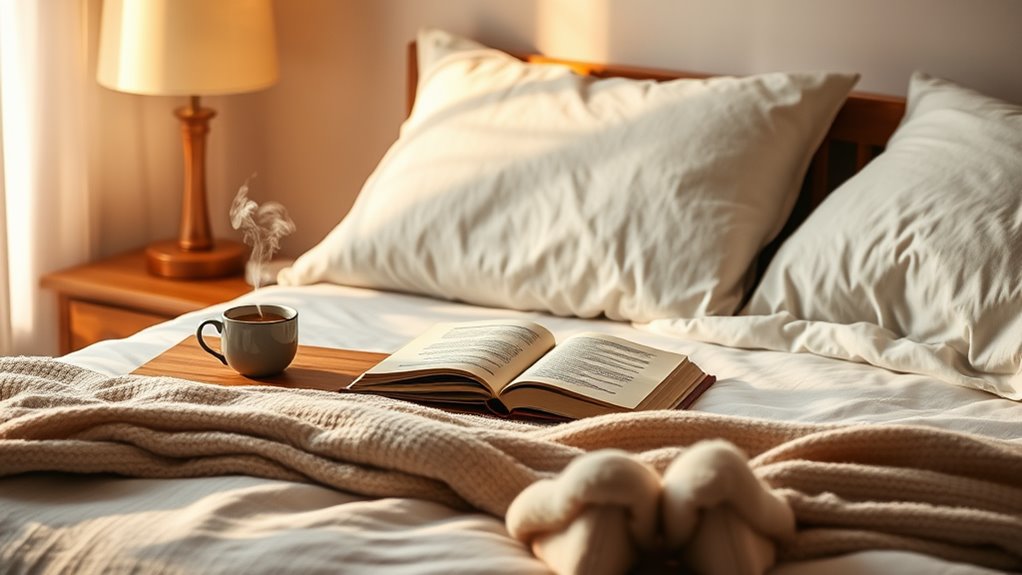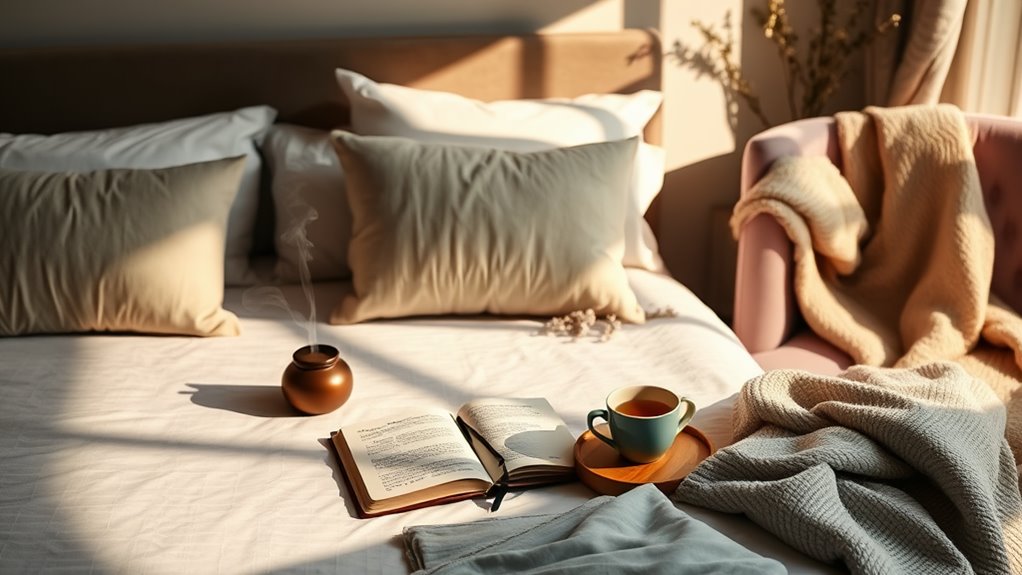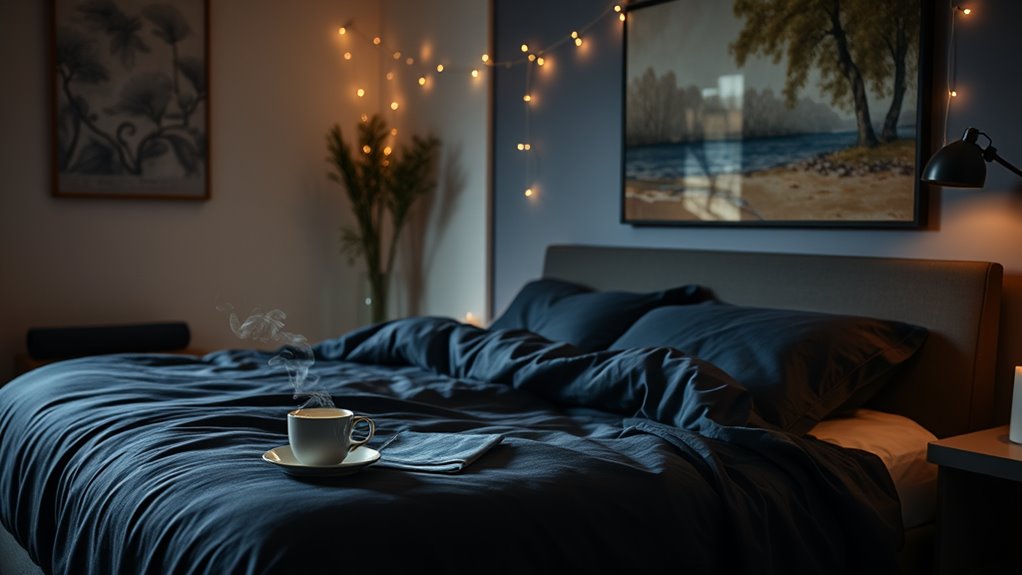The Evening Routine That Will Help You Sleep Like a Baby
To sleep like a baby, create a calming evening routine. Start with 30 minutes of light exercise, followed by a relaxing dinner. Unplug for an hour—try reading or listening to soothing music. Spend the next hour winding down: dim the lights, practice deep breathing, or do some gentle stretches. Consistency is key, so aim to follow this routine daily. Limit caffeine and screen time, as these can disrupt your sleep. By incorporating these elements, you’ll signal your body to relax and prepare for rest. There’s so much more you can explore to enhance your nightly wind-down.
Key Takeaways
- Engage in light exercise for 30 minutes to release stress and prepare your body for relaxation.
- Enjoy a nutritious dinner, allowing 30 minutes for digestion before winding down.
- Unplug from screens and read a book for an hour to reduce stimulation and promote calmness.
- Incorporate relaxation techniques like deep breathing or gentle yoga to ease tension before sleep.
- Maintain a consistent sleep schedule and limit caffeine after 2 PM for better sleep quality.
Importance of Evening Routines
As you wind down your day, establishing an evening routine can greatly enhance your sleep quality. An intentional routine signals to your body that it’s time to relax and prepare for rest.
By incorporating consistent activities, like reading or gentle stretching, you create a calming atmosphere that helps you unwind. This predictability reduces stress and anxiety, making it easier for your mind to shift into sleep mode.
Moreover, a well-structured evening routine helps regulate your internal clock, promoting better sleep patterns. When you prioritize this time, you’re not just preparing for bed; you’re investing in your overall well-being.
Ideal Time Blocks for Relaxation
Creating a calming evening routine is not just about the activities you choose but also about timing. By organizing your evening into ideal time blocks, you can maximize relaxation and prepare your mind for sleep.
| Time Block | Activity | Duration |
|---|---|---|
| 6:00 – 6:30 PM | Light Exercise | 30 minutes |
| 6:30 – 7:00 PM | Dinner | 30 minutes |
| 7:00 – 8:00 PM | Unplug & Read | 1 hour |
| 8:00 – 9:00 PM | Wind Down | 1 hour |
Relaxation Techniques to Try
Incorporating just a few relaxation techniques into your evening routine can considerably enhance your ability to unwind and prepare for sleep.
One effective method is deep breathing; take slow, deep breaths, inhaling through your nose and exhaling through your mouth.
You might also try progressive muscle relaxation, where you tense and then release each muscle group, starting from your toes and moving up to your head.
Guided imagery can transport you to a peaceful place—imagine a serene beach or a quiet forest.
Finally, consider gentle stretching or yoga, which can help release tension in your body.
Experiment with these techniques to discover what works best for you, and soon you’ll find it easier to drift off into a restful slumber.
Activities to Unwind Before Sleep
To unwind before sleep, consider engaging in calming activities that signal to your body it’s time to relax.
You might start by dimming the lights and turning off screens to reduce stimulation.
Try reading a book or listening to soothing music—both can help ease your mind.
Gentle stretches or yoga can also be beneficial, promoting relaxation in both your body and mind.
A warm bath or shower may further enhance your sense of calm, preparing you for rest.
You could also practice deep breathing exercises, focusing on your breath to clear your thoughts.
Whatever you choose, make sure it’s something you enjoy, creating a peaceful environment that encourages a restful sleep.
Lifestyle Adjustments for Better Sleep
While you may not realize it, small lifestyle adjustments can greatly impact your sleep quality. By making a few changes to your daily habits, you can set yourself up for a restful night. Consider the following adjustments:
| Adjustment | Benefits | Implementation Tips |
|---|---|---|
| Limit caffeine intake | Reduces insomnia | Cut off caffeine by 2 PM |
| Create a sleep schedule | Regulates sleep patterns | Sleep and wake at the same time daily |
| Stay active during the day | Boosts overall energy levels | Aim for 30 mins of exercise |
| Minimize screen time | Improves melatonin production | Switch off devices 1 hour before bed |
These changes can help you fall asleep faster and enjoy deeper rest, paving the way for better mornings.
Tracking Sleep Quality and Progress
Monitoring your sleep quality is essential for understanding how well you rest each night. Tracking your progress can reveal patterns and help you make necessary adjustments.
Here are some effective ways to keep tabs on your sleep:
- Use a sleep tracker or app to log your sleep duration and quality.
- Keep a sleep diary to note how you feel each morning.
- Track your bedtime routine to identify what works best.
- Monitor factors like caffeine intake and screen time before bed.
- Analyze your sleep environment for comfort and tranquility.
Frequently Asked Questions
Can I Skip My Evening Routine Occasionally?
Sure, you can skip your evening routine occasionally. Life happens, and it’s okay to adjust. Just remember, consistency helps build better habits, so try to return to it when you can for maximum benefits.
What if I Feel Anxious During My Routine?
If you feel anxious during your routine, try adjusting it. Incorporate calming activities like deep breathing or gentle stretches. Don’t hesitate to take breaks; listen to your body and prioritize what makes you feel relaxed.
Is It Better to Use Screens Before Bed?
Using screens before bed isn’t ideal. The blue light can disrupt your sleep cycle, making it harder to fall asleep. Instead, try reading a book or practicing relaxation techniques to wind down effectively.
How Long Should My Evening Routine Last?
Your evening routine should last about 30 to 60 minutes. This gives you enough time to unwind, reflect on your day, and prepare for sleep without feeling rushed or overwhelmed by the day’s activities.
Can I Change My Routine Frequently?
Yes, you can change your routine frequently! Experimenting helps you discover what works best for you. Just pay attention to how different activities affect your mood and sleep, and adjust accordingly to suit your needs.




